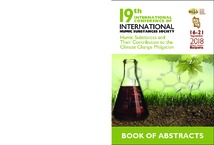Evolution of maize residues into SOM in a study of two years incubation.
Evolution of maize residues into SOM in a study of two years incubation.
Author(s): SONG, G. X.; NOVOTNY, E. H.; HAYES, M. H. B.
Summary: Maize (Zea mays, a C4 plant) stover was incubated in a long-term cultivated soil for 24 months in order to better understand the transformation of crop residues into soil organic matter. Humic fractions, including humin, were isolated using an exhaustive sequential extraction procedure based on the charge density and polarity differences of the humic substances: Repetitive aqueous NaOH extraction was carried out at pH 7, 10.6, 12.6, and with 0.5 M NaOH. Then, an exhaustive 0.1 M NaOH + 6 M urea solution was applied to the soil residue to isolate the soluble 'urea humin' fraction. All isolates were further fractionated by the XAD-8 and XAD-4 resin-in-tandem procedure. Finally a concentrated suphuric acid plus DMSO solvent was employed to the fine clay to isolate the most recalcitrant humin material. The samples were characterized by elemental and delta13C analyses, FTIR and solid-state 13C NMR spectroscopy with CSA-filter and DD spectral editing. The data indicated that ca 47%~60% and 28%~40% of tranformed organic carbon was in the HAs and FAs fractions. The urea FA fractions and DMSO/acid FA fractions showed less 13C enrichment compared to the fulvic fractions isolated in alkaline only solutions. The refractory humin was predominantly aliphatic and with low aromaticity.
Publication year: 2018
Types of publication: Paper in annals and proceedings
Unit: Embrapa Soils
Observation
Some of Embrapa's publications are published as ePub files. To read them, use or download one of the following free software options to your computer or mobile device. Android: Google Play Books; IOS: iBooks; Windows and Linux: Calibre.
Access other publications
Access the Agricultural Research Database (BDPA) to consult Embrapa's full library collection and records.
Visit Embrapa Bookstore to purchase books and other publications sold by Embrapa.

